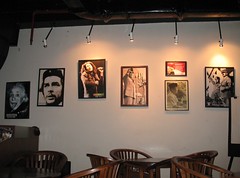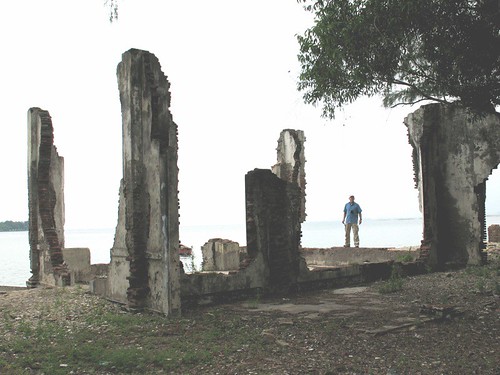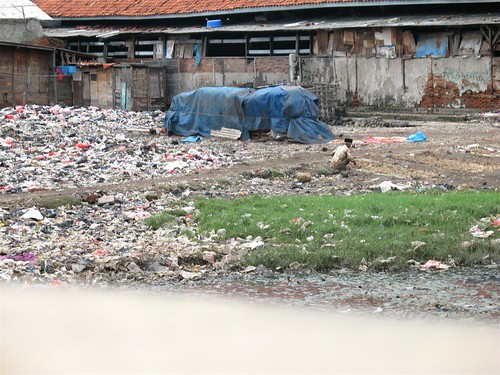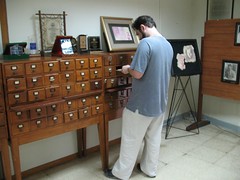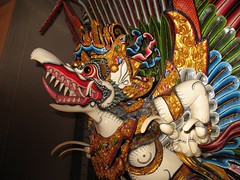When I lived in Exeter, NH, in 2001, there were 6 churches within 3 blocks of my apartment on Main Street: Lutheran, Baptist, Methodist, Congregational, Catholic, & non-denominational, which was part of Phillips Exeter Academy. A few blocks out from there you’d find a Episcopalian church, too. Probably more.
Over the course of my year there I visited services at almost all of them once, including the Islamic services held by Muslim students at Phillips Exeter Academy, in the weeks following 9/11.
Except for this last group, whose handful of worshippers, all teenage boys, seemed to go through their ablutions & prayers independently of spiritual (or adult) leadership, newly charged with a great, uncertain self-consciousness, these were mostly homey, neighborhood services with long-standing core members & gentle, boring, family-oriented sermons. Nearly everyone in the Baptist church had gray hair, except for me & a single, Chinese, high school freshman girl who sat in the back, looking dutiful & miserable.
They all rang their bells every Sunday & on holidays & special occasions. I liked the sound of them, though they woke me up. I probably laid imaginary plans to wax their clappers, in the way I currently fantasize about minaret-silencing EMPs, but I don’t recall. In time, I stopped hearing them.
I don’t mean any particular disrespect to the Christian churches in suggesting that most religious sermons are entirely uninspired; I find most sermons of any religion—as I find most books, plays, lectures, movies, political discussions, etc, my own contributions included—to be C-average boring, & rarely or actually about God. Not so much out of snobbery, but because these are works of ordinary people, not of God.
It may be self-evident but not always obvious: that it’s universally extraordinary to be extraordinary in any way, at anything.
In a town as tiny as Exeter, a foreign visitor (or Californian) might be alarmed at the sheer density of churches, some of them mere feet from one another, & might conclude that the town must be thick with fanatics.
I never knowingly met a fanatic in New Hampshire, either in the churches or on the street, but I read about them in the papers & given what emerged in the last two presidential elections, & the international reputation of “the grotesque theocracy of today’s America”
(Robert Hughes, Things I Didn’t Know, p. 144) (equal & opposite to our international reputation of being a superpower of Godless infidels), there must be some Exeter fanatics out there.
New Hampshire's epithet, “Live Free or Die” (which its convicts stamp on the state's license plates) sounds pretty fanatic to me.
When I interviewed the daughter of an Islamic cleric here in Jakarta, a Muslim educated in Catholic schools who now works in a political office, she lamented the growing density of mosques in Ache [ah’ chay]. Ache is a particularly religious & conservative town on the northern tip of Sumatra, hit worst by the tsunami 2 years ago, now living under Sharia (Muslim) law, where all Muslim women are required by law to wear
jilbab.
Also Banjarmasin, the capital of South Kalimantan (the island of Borneo). The cleric’s daughter hyperbolized that there are places where “every square inch has a mosque…It is a city with thousands of mosques & so many poor people….If any fraction of the money that goes into building mosques went to social programs to deal with poverty,” she said, the entire country would be tangibly improved.
True, perhaps, though easier said with a decentralized (Democratic) government & a fierce eye warding off government legislation of religion. Still, I take her point. When I witness government so inept or corrupt or feeble that the streets are thick with garbage & disease, people impoverished, the building of yet another alleged house of God, outside of which a democratic citizen can be stoned to death, can be a squander beyond all tolerance.
When I stand on my 30th story balcony with binoculars here in hazy Jakarta, I count 34 mosques & 1 enormous one under construction. From the window of the lavish Alila hotel in central Jakarta, I counted four mosques in a single square block all being walking distance from Istiqlal, the largest mosque in southeast Asia.
From the perspective of a foreigner, the sheer density of mosques can be alarming, some of them mere feet from one another, & one might conclude that the town is thick with fanatics. It’s not a perfect comparison for many reasons, but I haven’t knowingly met a fanatic in Jakarta, either in the mosques or in the street.
I read about them in the papers, though, & given what emerges every day in the news, & Islam’s international reputation as the cradle of terrorism (equal & opposite to the reputation I grew up with & saw represented on TV movies, & hear plead by Muslims everywhere on the street: that Islam is a religion of peace) (though I think everyone since the Incas calls theirs a 'religion of peace'), there are certainly Jakarta fanatics out there.
And there are. There is no denying this. But I suspect the density of mosques is not the measure of that danger, but rather one measure of C-average human inefficiency. Among other things.
I mean no disrespect to Islam in saying this: everyone who has ever walked the earth, to say nothing of those stridently paving it with houses of God, is lacking a certain degree of efficiency. Do we imagine that, like the
Balinese animists, if we build a worthy edifice, the divine spirit will sense & grace it? Are we all not, ourselves, houses of God, inspired & chilled with awe, or only uninhabited?
I only suspect it a human failing: that finding God indoors, much less at all, is more extraordinary than we claim. We just keep building houses.
